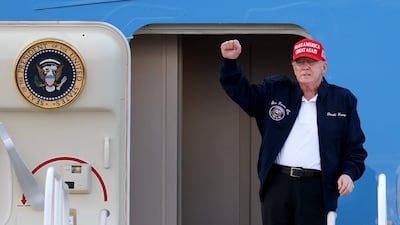President Donald Trump has been in office for a month, and in that short time has upended decades of US foreign policy towards the Middle East and left the region trying to figure out what to make of his musings.
Mr Trump, 78, has fashioned himself as a deal-making pacifist, saying in his inaugural address that his “proudest legacy will be that of a peacemaker and unifier". But his approach to ending the conflicts in Gaza and Ukraine is unorthodox and threatens to damage long-standing US alliances.
Within hours of returning to office, Mr Trump signed an executive order calling for a 90-day pause on foreign funding. Since then, he has overseen Elon Musk's evisceration of the US Agency for International Development, a decades-old institution that long served as the face of American soft power in the Middle East and beyond.
This month, Mr Trump invited Israeli Prime Minister Benjamin Netanyahu to Washington, the first visit by a foreign leader since the January 20 inauguration.
Standing alongside Mr Netanyahu, he left observers stunned as he proclaimed a new era of American diplomacy, saying he wanted to seize control of the Gaza Strip and redevelop it into the “Riviera of the Middle East.”
“The US will take over the Gaza Strip, and we will do a good job with it, too,” Mr Trump said. “We'll own it and be responsible for dismantling all of the dangerous unexploded bombs and other weapons on the site.”
Since then, he has repeated his comments, including during an awkward exchange with reporters in front of King Abdullah II.
Mr Trump claimed that “everyone loves” his plan for Gaza, but has not described a feasible means through which he could displace its two million residents. His claim that Egypt and Jordan will help him in no way matches reality.
Brian Katulis, a senior fellow at the Middle East Institute, said Mr Trump's remarks were aimed at trying to garner the spotlight without “producing much of anything on the positive side of the ledger".
“It was a lot of sound and fury, signifying not much,” he told The National.
The Gaza comments have seen Arab nations rushing to develop an alternative plan. The Arab League is set to hold an extraordinary meeting to address Gaza on March 4. On Friday, several regional leaders will meet in Saudi Arabia.
Mr Katulis, who rated the President’s first 30 days of foreign policy harshly, said the plan to take control of the Gaza Strip and expel Palestinians is a perfect example of how Mr Trump has approached his first 30 days.
“His first month in his second term essentially got a lot of headlines,” he said. “That's what he loves to do, but being a reality-television show character is not the same as being President of the United States and because of that, I don't think he's yet set himself up or his administration for success in the region.”
Mr Katulis said Mr Trump has waffled on his approach to Iran, reluctantly signing a memorandum declaring a return to maximum pressure against Tehran, while also indicating an openness for dialogue that has left many confused as to where he stands.
“Iran remains the biggest strategic challenge and threat in the region, and we don't have any clarity a month in from which direction Trump will take things,” Mr Katulis said. “On Mondays, Wednesdays and Fridays, Trump seems to indicate he's open for talks and a big deal. On Tuesdays and Thursdays, he hints at the idea that maybe Israel should conduct some operations against Iran and its nuclear sites.”
That unpredictability, a hallmark of the first Trump term, continues to rankle analysts.
“There's a bit more unpredictability this time around, and perhaps less clarity on the direction the US administration is going to take, particularly on Israel, Gaza and Arab-Israeli peace,” said Merissa Khurma, director of the Middle East Programme at the Wilson Centre.
While Mr Trump has given Secretary of State Marco Rubio the task to steer US diplomacy, it is clear the White House is the driving force behind decisions pertaining to the Middle East.
Steve Witkoff, Mr Trump's longtime confidant and golfing partner, has emerged as one of the most influential forces in the administration.
The billionaire real estate investor was hailed by all sides for helping to secure the ceasefire and hostage deal between Israel and Hamas. He has spent the last month criss-crossing the globe on behalf of Mr Trump.
“In terms of how the administration is going to carry out its policy in the region, it's likely that Trump is going to be at the centre of it,” said Ian Byrne, associate vice president at Beacon Global Strategies.
“Steve Witkoff is going to be very important, if not the most important deputy the President has in the region. And I think what comes out of Trump's mouth regarding anything Middle East-related is going to be US policy.”
That has left many in the region hanging off every word Mr Trump utters, never sure when he might attempt to dramatically reshape the regional chessboard with a seemingly off-the-cuff remark.
Mr Witkoff is also closely involved in Mr Trump's push to end the war in Ukraine. The US President has taken a critical stance against Kyiv and Europe and appears friendly towards Russian President Vladimir Putin, who has long been regarded as a US foe.
UK’s AI plan
- AI ambassadors such as MIT economist Simon Johnson, Monzo cofounder Tom Blomfield and Google DeepMind’s Raia Hadsell
- £10bn AI growth zone in South Wales to create 5,000 jobs
- £100m of government support for startups building AI hardware products
- £250m to train new AI models
Desert Warrior
Starring: Anthony Mackie, Aiysha Hart, Ben Kingsley
Director: Rupert Wyatt
Rating: 3/5
England v West Indies
England squad for the first Test Cook, Stoneman, Westley, Root (captain), Malan, Stokes, Bairstow, Moeen, Roland-Jones, Broad, Anderson, Woakes, Crane
Fixtures
1st Test Aug 17-21, Edgbaston
2nd Test Aug 25-29, Headingley
3rd Test Sep 7-11, Lord's
%20Ramez%20Gab%20Min%20El%20Akher
%3Cp%3E%3Cstrong%3ECreator%3A%3C%2Fstrong%3E%20Ramez%20Galal%3C%2Fp%3E%0A%3Cp%3E%3Cstrong%3EStarring%3A%3C%2Fstrong%3E%20Ramez%20Galal%3C%2Fp%3E%0A%3Cp%3E%3Cstrong%3EStreaming%20on%3A%20%3C%2Fstrong%3EMBC%20Shahid%3C%2Fp%3E%0A%3Cp%3E%3Cstrong%3ERating%3A%20%3C%2Fstrong%3E2.5%2F5%3C%2Fp%3E%0A
Mercer, the investment consulting arm of US services company Marsh & McLennan, expects its wealth division to at least double its assets under management (AUM) in the Middle East as wealth in the region continues to grow despite economic headwinds, a company official said.
Mercer Wealth, which globally has $160 billion in AUM, plans to boost its AUM in the region to $2-$3bn in the next 2-3 years from the present $1bn, said Yasir AbuShaban, a Dubai-based principal with Mercer Wealth.
“Within the next two to three years, we are looking at reaching $2 to $3 billion as a conservative estimate and we do see an opportunity to do so,” said Mr AbuShaban.
Mercer does not directly make investments, but allocates clients’ money they have discretion to, to professional asset managers. They also provide advice to clients.
“We have buying power. We can negotiate on their (client’s) behalf with asset managers to provide them lower fees than they otherwise would have to get on their own,” he added.
Mercer Wealth’s clients include sovereign wealth funds, family offices, and insurance companies among others.
From its office in Dubai, Mercer also looks after Africa, India and Turkey, where they also see opportunity for growth.
Wealth creation in Middle East and Africa (MEA) grew 8.5 per cent to $8.1 trillion last year from $7.5tn in 2015, higher than last year’s global average of 6 per cent and the second-highest growth in a region after Asia-Pacific which grew 9.9 per cent, according to consultancy Boston Consulting Group (BCG). In the region, where wealth grew just 1.9 per cent in 2015 compared with 2014, a pickup in oil prices has helped in wealth generation.
BCG is forecasting MEA wealth will rise to $12tn by 2021, growing at an annual average of 8 per cent.
Drivers of wealth generation in the region will be split evenly between new wealth creation and growth of performance of existing assets, according to BCG.
Another general trend in the region is clients’ looking for a comprehensive approach to investing, according to Mr AbuShaban.
“Institutional investors or some of the families are seeing a slowdown in the available capital they have to invest and in that sense they are looking at optimizing the way they manage their portfolios and making sure they are not investing haphazardly and different parts of their investment are working together,” said Mr AbuShaban.
Some clients also have a higher appetite for risk, given the low interest-rate environment that does not provide enough yield for some institutional investors. These clients are keen to invest in illiquid assets, such as private equity and infrastructure.
“What we have seen is a desire for higher returns in what has been a low-return environment specifically in various fixed income or bonds,” he said.
“In this environment, we have seen a de facto increase in the risk that clients are taking in things like illiquid investments, private equity investments, infrastructure and private debt, those kind of investments were higher illiquidity results in incrementally higher returns.”
The Abu Dhabi Investment Authority, one of the largest sovereign wealth funds, said in its 2016 report that has gradually increased its exposure in direct private equity and private credit transactions, mainly in Asian markets and especially in China and India. The authority’s private equity department focused on structured equities owing to “their defensive characteristics.”
The%20specs
%3Cp%3E%3Cstrong%3EEngine%3A%3C%2Fstrong%3E%202-litre%204-cylinder%3Cbr%3E%3Cstrong%3EPower%3A%20%3C%2Fstrong%3E153hp%20at%206%2C000rpm%3Cbr%3E%3Cstrong%3ETorque%3A%20%3C%2Fstrong%3E200Nm%20at%204%2C000rpm%3Cbr%3E%3Cstrong%3ETransmission%3A%20%3C%2Fstrong%3E6-speed%20auto%3Cbr%3E%3Cstrong%3EFuel%20consumption%3A%20%3C%2Fstrong%3E6.3L%2F100km%3Cbr%3E%3Cstrong%3EPrice%3A%20%3C%2Fstrong%3EDh106%2C900%3Cbr%3E%3Cstrong%3EOn%20sale%3A%20%3C%2Fstrong%3Enow%3C%2Fp%3E%0A
Profile of RentSher
Started: October 2015 in India, November 2016 in UAE
Founders: Harsh Dhand; Vaibhav and Purvashi Doshi
Based: Bangalore, India and Dubai, UAE
Sector: Online rental marketplace
Size: 40 employees
Investment: $2 million
What is the Supreme Petroleum Council?
The Abu Dhabi Supreme Petroleum Council was established in 1988 and is the highest governing body in Abu Dhabi’s oil and gas industry. The council formulates, oversees and executes the emirate’s petroleum-related policies. It also approves the allocation of capital spending across state-owned Adnoc’s upstream, downstream and midstream operations and functions as the company’s board of directors. The SPC’s mandate is also required for auctioning oil and gas concessions in Abu Dhabi and for awarding blocks to international oil companies. The council is chaired by Sheikh Khalifa, the President and Ruler of Abu Dhabi while Sheikh Mohamed bin Zayed, Abu Dhabi’s Crown Prince and Deputy Supreme Commander of the Armed Forces, is the vice chairman.
The%20specs
%3Cp%3E%3Cstrong%3EEngine%3A%3C%2Fstrong%3E%206.4-litre%20V8%0D%3Cbr%3E%3Cstrong%3ETransmission%3A%20%3C%2Fstrong%3E8-speed%20auto%0D%3Cbr%3E%3Cstrong%3EPower%3A%20%3C%2Fstrong%3E470bhp%0D%3Cbr%3E%3Cstrong%3ETorque%3A%20%3C%2Fstrong%3E637Nm%0D%3Cbr%3E%3Cstrong%3EPrice%3A%20%3C%2Fstrong%3EDh375%2C900%20(estimate)%0D%3Cbr%3E%3Cstrong%3EOn%20sale%3A%3C%2Fstrong%3E%20now%3C%2Fp%3E%0A
How to help
Send “thenational” to the following numbers or call the hotline on: 0502955999
2289 – Dh10
2252 – Dh 50
6025 – Dh20
6027 – Dh 100
6026 – Dh 200




